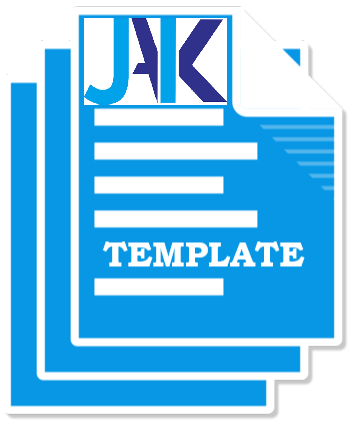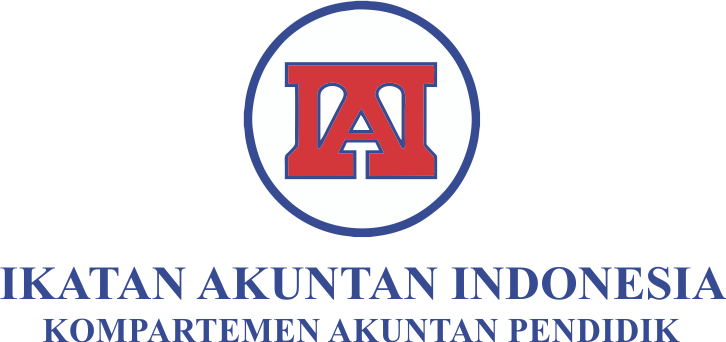FAKTOR TEKANAN INSTITUSIONAL DALAM MEMENGARUHI KUALITAS INFORMASI AKUNTANSI: PENDEKATAN METODA CAMPURAN
Abstract
Government financial statements, either from the central government or local government was obliged to gain an unqualified opinion from the Audit Board of Indonesia. However, although the government had gained it, based on investigation on the financial statements, the Audit Board of Indonesia still found some problems and concerned notes. Therefore, the researcher believed that further analysis on factors affecting accounting information quality was required. In accordance with previous research findings, there were several factors influencing such quality, i.e. external and internal institutional pressures that might have impacted the quality. Sample used was the secretaries and heads of finance subsection of all regional working units in the Local Government of Sleman. Research method used to explore the problems, map situational complexities, find out diverse participants’ perspectives, and observe the relationship among variables was the mix method. Research findings indicated strong evidence of the effects of external pressures on institutional internal factors. Furthermore, institutional internal factors positively affected accounting information quality; external pressures positively affected accounting information quality; while institutional internal factors mediated the effects of external pressures on accounting information quality.
Full Text:
PDF (Bahasa Indonesia)References
Adhikari, P., & Mellemvik, F. (2011). The rise and fall of accruals: a case of Nepalese central government. Journal of Accounting in Emerging Economies, 1(2), 123–143. https://doi.org/10.1108/20421161111138495
Alawattage, C., Hopper, T., Wickramasinghe, D., & Tambulasi, R. I. C. (2007). Who is fooling who?: New public management-oriented management accounting and political control in the Malawi’s local governance. Journal of Accounting & Organizational Change, 3(3), 302–328. https://doi.org/10.1108/18325910710820319
Bertot, J. C., Jaeger, P. T., & Grimes, J. M. (2010). Using ICTs to create a culture of transparency: E-government and social media as openness and anti-corruption tools for societies. Government Information Quarterly, 27(3), 264–271. https://doi.org/10.1016/j.giq.2010.03.001
Collier, P. M. (1999). THE POWER OF ACCOUNTING : A FIELD STUDY OF LOCAL FINANCIAL MANAGEMENT IN A POLICE FORCE by RP9937 December 1999 This paper describes the introduction of local financial management into a police force , can reinforce the interpretive scheme and satisfy bot. Business, (0121), 1–34.
DiMaggio, P., & Powell, W. (1983). The Iron Cage Revisited : Institutional Isomorphism and Collective Rationality in Organizational Fields Author ( s ): Paul J . DiMaggio and Walter W . Powell Source : American Sociological Review , Vol . 48 , No . 2 ( Apr ., 1983 ), pp . 147-160 Published. American Sociological Review, 48(2), 147–160.
Dull, M. (2009). Results-model reform leadership: Questions of credible commitment. Journal of Public Administration Research and Theory, 19(2), 255–284. https://doi.org/10.1093/jopart/mum043
Edvardsson, E., & Enquist, E. (2006). Quality improvement in governmental services: The role of change pressure exerted by the “market.†The TQM Magazine (Vol. 18). https://doi.org/10.1108/09544780610637659
Mbelwa, L. (2015). Factors Influencing The Use Of Accounting Information In Tanzanian Local Government Authorities (LGAS): An Institutional Theory Approach. The Public Sector Accounting, Accountability and Auditing in Emerging Economies, 15, 143–177. https://doi.org/10.1108/S1479-356320150000015001
Modell, S. (2001). Performance measurement and institutional processes: A study of managerial responses to public sector reform. Management Accounting Research, 12(4), 437–464. https://doi.org/10.1006/mare.2001.0164
Moynihan, D. P., & Pandey, S. K. (2010). The big question for performance management: Why do managers use performance information? Journal of Public Administration Research and Theory, 20(4), 849–866. https://doi.org/10.1093/jopart/muq004
Nalukenge, I., Nkundabanyanga, S. K., & Tauringana, V. (2012). Literacy, external user-pressure and quality of accounting information of Ugandan SMEs. Research in Accounting in Emerging Economies (Vol. 12). Emerald Group Publishing Ltd. https://doi.org/10.1108/S1479-3563(2012)000012A007
Nurdin, N., Stockdale, R., & Scheepers, H. (2012). The influence of external institutional pressures on local e-government adoption and implementation: A coercive perspective within an indonesian local e-government context. Lecture Notes in Computer Science (Including Subseries Lecture Notes in Artificial Intelligence and Lecture Notes in Bioinformatics), 7443 LNCS, 13–26. https://doi.org/10.1007/978-3-642-33489-4_2
Olesson, E., Albert, E., Coroneos, R., Leeson, R., and Wyatt, R. (2012). Options for a Local Government Framework Government Framework. Options, (January).
Potter, B. N. (2005). Accounting as a social and institutional practice: Perspectives to enrich our understanding of accounting change. Abacus, 41(3), 265–289. https://doi.org/10.1111/j.1467-6281.2005.00182.x
Sarker, A. E. (2006). New public management in developing countries: An analysis of success and failure with particular reference to Singapore and Bangladesh. International Journal of Public Sector Management, 19(2), 180–203. https://doi.org/10.1108/09513550610650437
Suddaby, R. (2010). Challenges for institutional theory. Journal of Management Inquiry, 19(1), 14–20. https://doi.org/10.1177/1056492609347564
Vyas, R., & Souchon, A. L. (2003). Symbolic use of export information. International Marketing Review, 20(1), 67–94. https://doi.org/10.1108/02651330310462275
Xu, H., Horn, J., Daryl, N. G., Binshan, N., Xu, H., & Nord, G. D. (2012). Key issues of accounting information quality management : Australian case studies Key issues of accounting information quality management : Australian case studies. https://doi.org/10.1108/02635570310489160
Zhou, L. (2010). The Research on Issue and Countermeasures of Accounting Information of SMES. International Journal of Business and Management, 5(3), 223–225. https://doi.org/10.5539/ijbm.v5n3p223
DOI: https://doi.org/10.37058/jak.v15i1.1508
Refbacks
- There are currently no refbacks.
Copyright (c) 2020 JURNAL AKUNTANSI

This work is licensed under a Creative Commons Attribution-NonCommercial-ShareAlike 4.0 International License.

Jurnal Akuntansi by Jurusan Akuntansi Fakultas Ekonomi dan Bisnis Universitas Siliwangi is licensed under a Creative Commons Attribution-NonCommercial-ShareAlike 4.0 International License.
Based on a work at http://jurnal.unsil.ac.id/index.php/jak.
Jurnal Akuntansi Visitor Counter JAK Stats





